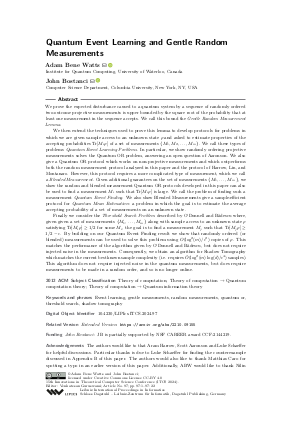@InProceedings{watts_et_al:LIPIcs.ITCS.2024.97,
author = {Watts, Adam Bene and Bostanci, John},
title = {{Quantum Event Learning and Gentle Random Measurements}},
booktitle = {15th Innovations in Theoretical Computer Science Conference (ITCS 2024)},
pages = {97:1--97:22},
series = {Leibniz International Proceedings in Informatics (LIPIcs)},
ISBN = {978-3-95977-309-6},
ISSN = {1868-8969},
year = {2024},
volume = {287},
editor = {Guruswami, Venkatesan},
publisher = {Schloss Dagstuhl -- Leibniz-Zentrum f{\"u}r Informatik},
address = {Dagstuhl, Germany},
URL = {https://drops.dagstuhl.de/entities/document/10.4230/LIPIcs.ITCS.2024.97},
URN = {urn:nbn:de:0030-drops-196254},
doi = {10.4230/LIPIcs.ITCS.2024.97},
annote = {Keywords: Event learning, gentle measurments, random measurements, quantum or, threshold search, shadow tomography}
}

 Creative Commons Attribution 4.0 International license
Creative Commons Attribution 4.0 International license










